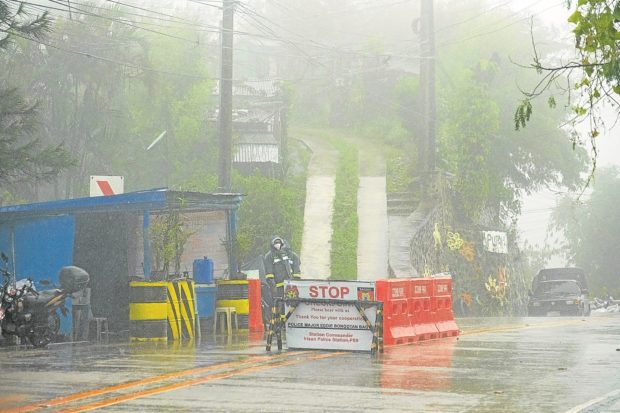
ON ALERT Police man checkpoints in Baguio City amid driving rain to check the travel requirements of people entering the summer capital. The city has again prohibited the entry of tourists and nonessential travelers amid the threat of the more contagious Delta variant of COVID-19. —NEIL CLARK ONGCHANGCO/CONTRIBUTOR
BAGUIO CITY—The local government on Friday shut its doors anew on tourists and other nonessential travelers as precaution against the threat of the more transmissible Delta variant of COVID-19.
In an advisory, Mayor Benjamin Magalong said the travel restriction covers visitors regardless of the place of origin and would remain effective until Aug. 15.On July 31, Magalong had already closed the city’s borders for one week, banning tourists and nonauthorized persons outside residence from entering here, citing the existing health risks posed by the Delta variant.
“Due to the higher transmissibility of the Delta variant, we must take necessary steps to mitigate its impact on our community,” the mayor said.
Based on the recent border guidelines issued by Magalong, only travelers with “indispensable purposes” would be allowed to enter the city.
But essential travelers would still be required to present valid identification cards and negative reverse transcription polymerase chain reaction (RT-PCR) test results taken 72 hours prior to their entry or a vaccination passport for fully inoculated individuals.
67 variant cases
Last month, Baguio recorded 67 variant patients, but none had been infected with the Delta strain.
The 58 variant cases in the city were stricken with the Alpha (United Kingdom) form of COVID-19 while nine contracted the Beta (South Africa) variant.
As of Thursday, the city still has 373 active infections out of the 15,742 COVID-19 cases recorded since March last year. The city also registered 311 deaths related to the viral disease.
“Once again, I caution everyone to limit travel outside of the city, unless it is absolutely necessary. Let us continue to keep our guards up, and be mindful of standard health protocols at all times,” Magalong said.
Protect residents
In Ilocos Sur province, sweeping travel restrictions were enforced from July 31 to Aug. 20, banning leisure travelers coming from the National Capital Region (NCR) Plus bubble and other high-risk areas of virus infections.
The NCR Plus bubble refers to the containment zone of Metro Manila and the surrounding provinces of Bulacan, Laguna, Cavite and Rizal.
All tourists from the NCR Plus bubble who have confirmed bookings were asked to reschedule their travel to the province.
Starting Aug. 2, Ilocos Sur Gov. Ryan Luis Singson said in an executive order that the province would require essential travelers to present negative RT-PCR test results taken within 72 hours prior to their travel. In Ilocos Norte province, visitors were barred since July 23 from visiting the coastal town of Pagudpud, one of the province’s top tourist drawers.
Celine Abad, Pagudpud’s tourism operations officer, told the Inquirer on Monday that the suspension would be indefinite or until the town reverts to modified general community quarantine, the least restrictive quarantine classification in the country.
On Aug. 1, Pagudpud was one of the areas in the province that was placed on enhanced community quarantine, the strictest quarantine curb in the country, after a 73-year-old resident of the town was confirmed to have been infected with the Delta variant.
Red zones
Ilocos Norte was also placed under alert level 4 due to its high number of COVID-19 cases and hospital utilization rate, the Department of Health said on Friday.
Health Undersecretary Maria Rosario Vergeire, in a televised briefing, said the province was classified as one of the 37 areas under the alert level as it reached moderate to critical risk of COVID-19 infections and whose utilization rate of either their total COVID-19 or intensive care unit bed utilization are more than 70 percent.
Data from the provincial health task force showed that at least 14 patients in the province had been infected with the highly contagious variants of COVID-19, with eight cases of Alpha variant, one case of Beta, and five cases of the Delta variant.
Ilocos Norte logged 345 new COVID-19 cases on Thursday, placing 22 of the 23 cities and towns under “red zones” for having at least 21 active cases.
The province still has 4,056 active cases out of the 9,527 infections it logged since the pandemic began last year, with 5,339 recoveries and 132 deaths. —REPORTS FROM ALLAN MACATUNO AND JOHN MICHAEL MUGAS